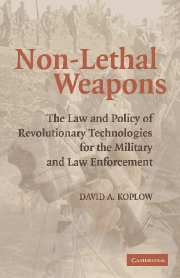 Non-Lethal Weapons
Non-Lethal Weapons Book contents
- Frontmatter
- Contents
- Acknowledgments
- 1 INTRODUCTION
- 2 THE WORLD OF NON-LETHAL WEAPONS
- 3 THE LAW OF NON-LETHAL WEAPONS
- 4 THE FBI AND THE DAVIDIANS AT WACO IN 1993
- 5 THE UNITED NATIONS AND THE RWANDAN GENOCIDE IN 1994
- 6 THE PERUVIANS AND TUPAC AMARU IN LIMA IN 1996–1997
- 7 THE RUSSIANS AND THE CHECHENS IN MOSCOW IN 2002
- 8 THE BRITISH AND THE IRAQIS IN BASRA IN 2003
- 9 CAUTIONARY CONSIDERATIONS
- 10 RECOMMENDATIONS AND CONCLUSIONS
- Select Bibliography
- Index
8 - THE BRITISH AND THE IRAQIS IN BASRA IN 2003
Published online by Cambridge University Press: 29 July 2009
- Frontmatter
- Contents
- Acknowledgments
- 1 INTRODUCTION
- 2 THE WORLD OF NON-LETHAL WEAPONS
- 3 THE LAW OF NON-LETHAL WEAPONS
- 4 THE FBI AND THE DAVIDIANS AT WACO IN 1993
- 5 THE UNITED NATIONS AND THE RWANDAN GENOCIDE IN 1994
- 6 THE PERUVIANS AND TUPAC AMARU IN LIMA IN 1996–1997
- 7 THE RUSSIANS AND THE CHECHENS IN MOSCOW IN 2002
- 8 THE BRITISH AND THE IRAQIS IN BASRA IN 2003
- 9 CAUTIONARY CONSIDERATIONS
- 10 RECOMMENDATIONS AND CONCLUSIONS
- Select Bibliography
- Index
Summary
Finally, we turn for our fifth case study to an instance of conventional military combat. Or nearly conventional combat – when modern troops are engaged in “military operations in urban terrain” (MOUT), many of the ordinary verities of warfare are suspended or modified. The wrestling in Iraq at the outset of Gulf War II revealed many of the characteristic difficulties of fighting in an environment in which armed enemy troops are intermingled with civilians and with irregular, nonuniformed – but deadly – opponents, and in which the troops' assigned mission may creep inexorably forward.
BACKGROUND ON THE BASRA CONFRONTATION
Basra is an ancient city, Iraq's second largest, situated in the southeastern corner of the country, at the confluence of the historic Tigris and Eurprates rivers. It commands Iraq's only port (on the Persian Gulf), and its population (variously estimated as between one and two million) is squeezed between Kuwait to the south, Iran to the east, and the rich Rumeila oil fields to the west. Importantly, 60 percent of the residents are Shia Moslems, the sect that is numerically more common in Iraq, but that had for decades been repressed by Saddam Hussein and his predominantly northern Sunni Moslem brethren. Basra has therefore long been viewed with suspicion, at best, by Baghdad, and the city was rightly considered a possible source of smoldering antiregime sentiment.
- Type
- Chapter
- Information
- Non-Lethal WeaponsThe Law and Policy of Revolutionary Technologies for the Military and Law Enforcement, pp. 113 - 128Publisher: Cambridge University PressPrint publication year: 2006


